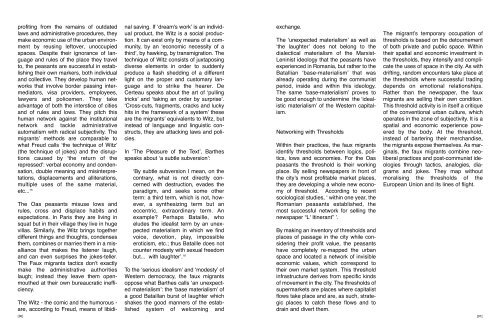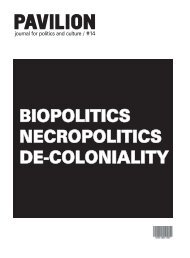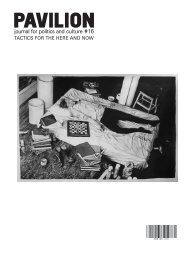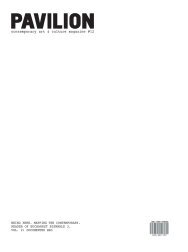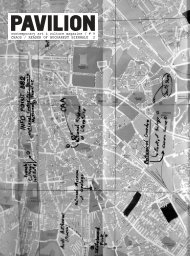PAVILION
PAVILION
PAVILION
- No tags were found...
Create successful ePaper yourself
Turn your PDF publications into a flip-book with our unique Google optimized e-Paper software.
profiting from the remains of outdated<br />
laws and administrative procedures, they<br />
make economic use of the urban environment<br />
by reusing leftover, unoccupied<br />
spaces. Despite their ignorance of language<br />
and rules of the place they travel<br />
to, the peasants are successful in establishing<br />
their own markers, both individual<br />
and collective. They develop human networks<br />
that involve border passing intermediators,<br />
visa providers, employees,<br />
lawyers and policemen. They take<br />
advantage of both the interstice of cities<br />
and of rules and lows. They pitch this<br />
human network against the institutional<br />
network and tackle administrative<br />
automatism with radical subjectivity. The<br />
migrants’ methods are comparable to<br />
what Freud calls ‘the technique of Witz’<br />
(the technique of jokes) and the disruptions<br />
caused by 'the return of the<br />
repressed': verbal economy and condensation,<br />
double meaning and misinterpretations,<br />
displacements and alliterations,<br />
multiple uses of the same material,<br />
etc... 15<br />
The Oas peasants misuse lows and<br />
rules, cross and displace habits and<br />
expectations. In Paris they are living in<br />
squat but in their village they live in huge<br />
villas. Similarly, the Witz brings together<br />
different things and thoughts, condenses<br />
them, combines or marries them in a misalliance<br />
that makes the listener laugh,<br />
and can even surprises the jokes-teller.<br />
The Faux migrants tactics don’t exactly<br />
make the administrative authorities<br />
laugh; instead they leave them openmouthed<br />
at their own bureaucratic inefficiency.<br />
The Witz - the comic and the humorous -<br />
are, according to Freud, means of libidinal<br />
saving. If ‘dream's work’ is an individual<br />
product, the Witz is a social production.<br />
It can exist only by means of a community,<br />
by an ‘economic necessity of a<br />
third’, by hawking, by transmigration. The<br />
technique of Witz consists of juxtaposing<br />
diverse elements in order to suddenly<br />
produce a flash shedding of a different<br />
light on the proper and customary language<br />
and to strike the hearer. De<br />
Certeau speaks about the art of ‘pulling<br />
tricks’ and ‘taking an order by surprise’.<br />
‘Cross-cuts, fragments, cracks and lucky<br />
hits in the framework of a system’ these<br />
are the migrants' equivalents to Witz, but<br />
instead of language and linguistic constructs,<br />
they are attacking laws and policies.<br />
In ‘The Pleasure of the Text’, Barthes<br />
speaks about ‘a subtle subversion’:<br />
‘By subtle subversion I mean, on the<br />
contrary, what is not directly concerned<br />
with destruction, evades the<br />
paradigm, and seeks some other<br />
term: a third term, which is not, however,<br />
a synthesizing term but an<br />
eccentric, extraordinary term. An<br />
example? Perhaps Bataille, who<br />
eludes the idealist term by an unexpected<br />
materialism in which we find<br />
voice, devotion, play, impossible<br />
eroticism, etc.; thus Bataille does not<br />
counter modesty with sexual freedom<br />
but... with laughter’. 16<br />
To the ‘serious idealism’ and ‘modesty’ of<br />
Western democracy, the faux migrants<br />
oppose what Barthes calls ‘an unexpected<br />
materialism’: the ‘base materialism’ of<br />
a good Bataillan burst of laughter which<br />
shakes the good manners of the established<br />
system of welcoming and<br />
exchange.<br />
The ‘unexpected materialism’ as well as<br />
‘the laughter’ does not belong to the<br />
dialectical materialism of the Marxist-<br />
Leninist ideology that the peasants have<br />
experienced in Romania, but rather to the<br />
Batallian ‘base-materialism’ that was<br />
already operating during the communist<br />
period, inside and within this ideology.<br />
The same ‘base-materialism’ proves to<br />
be good enough to undermine the ‘idealistic<br />
materialism’ of the Western capitalism.<br />
Networking with Thresholds<br />
Within their practices, the faux migrants<br />
identify thresholds between logics, politics,<br />
lows and economies. For the Oas<br />
peasants the threshold is their working<br />
place. By selling newspapers in front of<br />
the city’s most profitable market places,<br />
they are developing a whole new economy<br />
of threshold. According to recent<br />
sociological studies, ‘ within one year, the<br />
Romanian peasants established, the<br />
most successful network for selling the<br />
newspaper “L' Itinerant” ’.<br />
By making an inventory of thresholds and<br />
places of passage in the city while considering<br />
their profit value, the peasants<br />
have completely re-mapped the urban<br />
space and located a network of invisible<br />
economic values, which correspond to<br />
their own market system. This threshold<br />
infrastructure derives from specific kinds<br />
of movement in the city. The thresholds of<br />
supermarkets are places where capitalist<br />
flows take place and are, as such, strategic<br />
places to catch these flows and to<br />
drain and divert them.<br />
The migrant’s temporary occupation of<br />
thresholds is based on the detournement<br />
of both private and public space. Within<br />
their spatial and economic investment in<br />
the thresholds, they intensify and complicate<br />
the uses of space in the city. As with<br />
drifting, random encounters take place at<br />
the thresholds where successful trading<br />
depends on emotional relationships.<br />
Rather than the newspaper, the faux<br />
migrants are selling their own condition.<br />
This threshold activity is in itself a critique<br />
of the conventional urban culture, which<br />
operates in the zone of subjectivity. It is a<br />
spatial and economic experience powered<br />
by the body. At the threshold,<br />
instead of bartering their merchandise,<br />
the migrants expose themselves. As marginals,<br />
the faux migrants combine neoliberal<br />
practices and post-communist ideologies<br />
through tactics, analogies, diagrams<br />
and jokes. They map without<br />
moralising the thresholds of the<br />
European Union and its lines of flight.<br />
[96]<br />
[97]


